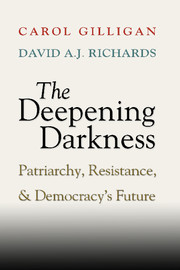Book contents
- Frontmatter
- Contents
- Acknowledgments
- Introduction and Overview
- Part One Roman Patriarchy: Entering the Darkness
- Part Two Resistance Across Time and Culture
- 6 Resistance: Religion
- 7 Resistance: Psychology
- 8 Resistance: The Artists
- 9 Resistance: Politics
- Part Three Democracy's Future
- Conclusion
- Notes
- Bibliography
- Index
7 - Resistance: Psychology
Published online by Cambridge University Press: 01 September 2010
- Frontmatter
- Contents
- Acknowledgments
- Introduction and Overview
- Part One Roman Patriarchy: Entering the Darkness
- Part Two Resistance Across Time and Culture
- 6 Resistance: Religion
- 7 Resistance: Psychology
- 8 Resistance: The Artists
- 9 Resistance: Politics
- Part Three Democracy's Future
- Conclusion
- Notes
- Bibliography
- Index
Summary
Why is patriarchy so powerful? One reason is that it has profoundly shaped not only our religion and politics but also our very understanding of ourselves, our psychology. We can see the power and consequences of this influence most clearly in a great psychologist, Sigmund Freud, who turned abruptly away from his early insights into the sources and nature of human suffering to a psychology that inscribed patriarchy as in the nature of things. We examine and analyze this development closely, arguing that at a crucial point, Freud's ambition to succeed according to the terms of Viennese manhood against the background of an increasingly aggressive political anti-Semitism distorted, as patriarchy often does, some of his most creative and lasting contributions to human understanding. We show the continuing power of the psychology of Roman patriarchy in modernity as Freud frames his struggles to manhood in terms of the Aeneid. We then consider alternative views within psychoanalysis, in particular, those of Sandor Ferenczi and Ian Suttie, who, even in Freud's lifetime, exposed and questioned his confusion of patriarchal culture with human nature, offering a different reading of the relationship between culture and psychology.
Ferenczi and then Suttie located in history, including the history of an individual life, what Freud had naturalized: the identification with the voice or law of the father and the prevalence of aggression or violence. Where Freud saw development or instinct at work, Ferenczi saw trauma and Suttie the breaking of intimate relationship.
- Type
- Chapter
- Information
- The Deepening DarknessPatriarchy, Resistance, and Democracy's Future, pp. 159 - 197Publisher: Cambridge University PressPrint publication year: 2008



